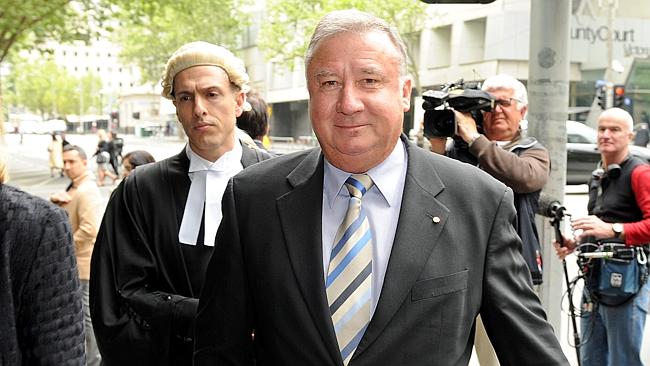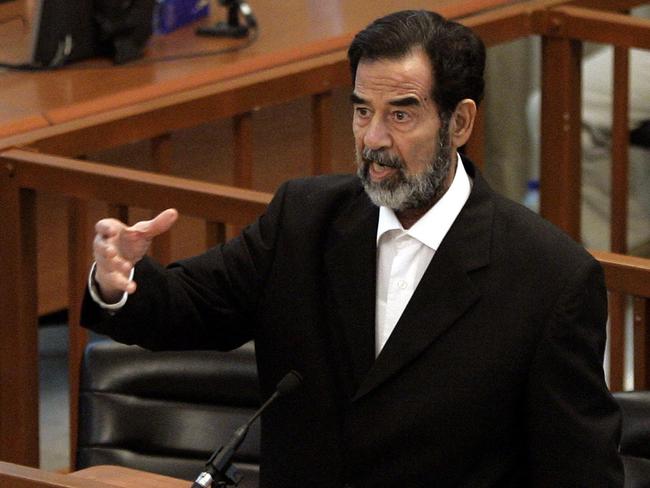Court hears of failure to stop ‘evil’ sham payments to Saddam Hussein
THE corporate watchdog has lashed a former chairman in court over his alleged role in Australia’s biggest corruption scandal.

ALMOST two decades after the Australian Wheat Board oil-for-food scandal unfolded, a key figure in the alleged kickback scheme that shocked the nation is again facing court.
Then chairman Trevor James Flugge should have blown the whistle on the AWB’s alleged $300 million sham payments to Saddam Hussein’s regime, his trial heard today.
Australian Securities and Investments Commission counsel Norman O’Bryan SC said Mr Flugge was obligated to stand up and tell the company to stop the “evil” practice.
Mr Flugge has denied helping negotiate kickbacks to the Hussein regime in Iraq to secure wheat sale contracts.
Mr O’Bryan told the court that Mr Flugge should have said: “We must not do this. We must stop. It’s wrong. It’s evil. It’s highly dangerous because there is a serious risk that we will get caught.”
Mr Flugge should have said the consequences could be utterly disastrous if the practice was not stopped, he argued.
“As chairman of the board of this company Mr Flugge could have done many things which would have put an effective end to what occurred,” Mr O’Bryan said.
Mr Flugge and AWB’s former group general manager trading Peter Anthony Geary are facing a civil trial for allegedly breaching their duties as officers.
The Victorian Supreme Court heard that AWB’s contracts with the Iraqi Grain Board under the United Nations oil-for-food program were inflated by disguised inland transportation and after-sale service fees.
Mr O’Bryan said unknown to Australia’s international competitors, AWB accepted a lower price for its wheat and the secret payments effectively handed currency to an Iraqi government desperately in need of all the international currency it could get.
“In effect AWB became an exporter of two commodities from Australia — wheat and cash.”
The UN essentially took control of Iraq’s international trade following the country’s invasion of Kuwait in 1990, the court heard.

Mr O’Bryan said the international community sought to limit and prevent Hussein’s “monstrous activities” both in respect of his near neighbours and a much wider group of neighbouring countries.
“The UN sought to tighten its grip around Saddam Hussein by denying to him the use of international currency which they knew that he would use to buy things like weaponry to threaten and attack his neighbours.”
A coalition of countries, including Australia, invaded Iraq in 2003 and Mr O’Bryan said the Americans in particular were deeply suspicious of AWB’s contracts.
“It did not take them long to work out that those contracts had been improperly inflated to insert the inland transportation fees and the after-sales service fees,” he said.
The court heard AWB made payments for purported Iraqi Grain Board fees totalling more than $US220 million, which AWB then recovered from a UN escrow account.
“The completely inexplicable inflation of the so-called inland transportation fees ... would have made it as plain as a pikestaff had nothing to do with the cost of inland transport,” Mr O’Bryan said.
He said AWB sought no explanation or justification for what was actually happening to the money it paid to an intermediary company.
“It simply closed its eyes and paid,” Mr O’Bryan said.
In a statement released by his lawyers, Mr Flugge said he and his family had lived with untested allegations, rumours and innuendo since the ASIC action started in 2007.
“For the sake of my family I trust that these will finally be put to rest,” he said.
“I fervently believe now, as I did from day one, that I have done nothing wrong.”
THE RISE AND FALL OF AWB
* Australian Wheat Board had monopoly over international trade in Australian wheat from 1939
* By 1999, marketing and transfer functions transferred to grower-owned AWB Group. AWB Ltd heads that structure, lists on stock market 2001
* UN imposes sanctions after Iraq’s 1990 invasion of Kuwait
* UN oil-for-food program runs 1997 to 2003
* AWB wins wheat sales with Iraqi Grain Board
* Iraq is AWB’s biggest or close to biggest customer
* Sales worth more than $500 mln a year
* Unknown to its international competitors, AWB accepts lower price than revealed in contracts
* Inflated by sham, so-called `inland transportation’ and `after-sales service fees’
* Payments always made via intermediary based in Jordan, linked to Iraqi authorities
* AWB pays $US223 million in those fees to intermediary company Alia between July 1999 and March 2003
* AWB in effect becomes exporter of wheat and cash, ASIC says
* UN oil-for-food program ends after coalition forces invade Iraq in 2003
* Cole inquiry in 2006 finds AWB knowingly made secret payments to Saddam Hussein regime
* AWB taken over by Canadian company Agrium in 2010




